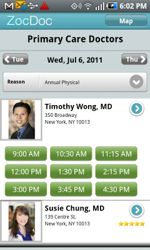

While a provider’s day is packed with appointments, the liaison acts as their conduit in the surrounding area, pitching their skills to potential referrers. Liaisons are often former pharmaceutical or medical equipment representatives who have knowledge of the health care industry and specific clinical data along with interpersonal skills. “They could be Harvard-educated and still think, ‘No one knows who I am.’” “In specialty practices, what haunts doctors is the fear that no one will know what they offer,” says Kriss Barlow, RN, a principal of hospital consulting firm Barlow/McCarthy and an expert in physician marketing. That’s why many large groups and hospital system utilize a physician liaison, an individual who acts as a provider’s avatar in the community, informing health care professionals of their services and reporting back with information about the landscape in their area. Even though patients are doing more research than ever when it comes to selecting health care providers, a recommendation from their primary care physician is still the biggest influencer: Primary care is responsible for up to 70 percent of referrals, and understanding how to both open and maintain that line of communication is crucial for any specialty medical practice. If you’re a specialist, you probably have an instinctive notion that referrals are a prerequisite to doing business.


 0 kommentar(er)
0 kommentar(er)
